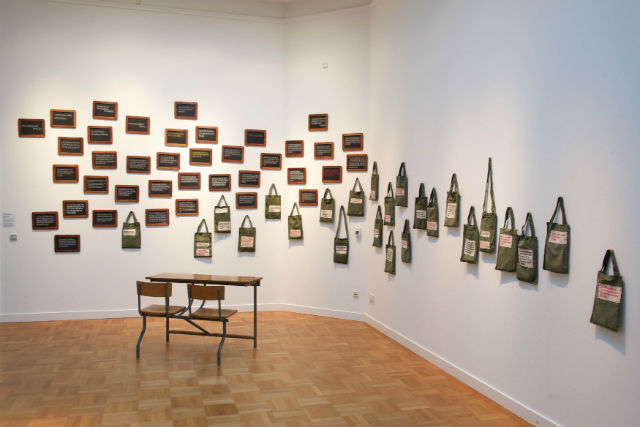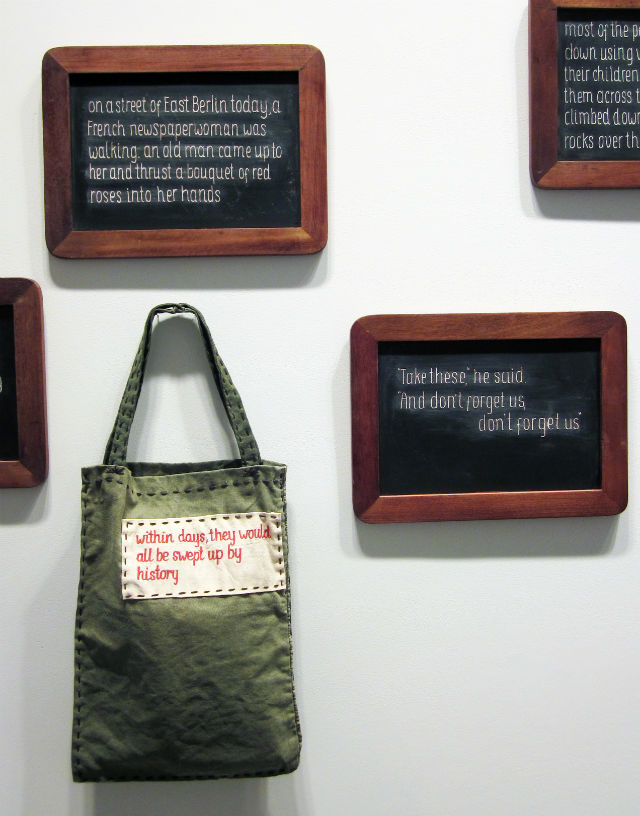The Processing of and Going Back-and-Forth on a Project
Sano: Do you work on one project after another in sequence or do you work on a few simultaneously? I read that you felt it was too much when working on an archaeology project for future remembrance (2010–ongoing) and finding one's shadow in ruins and rubble (2014), for instance, and you revisited them at a later year.
Chung: It was also like that with scratching the walls of memory (2009–2010), the project that was inspired by the story of Fukuromachi Elementary School in Hiroshima, Japan.*1 About fifty years after the A-bomb was dropped in Hiroshima and Nagasaki, the school was turned into a peace museum. At the time of renovation, chalkboards and layers of old paint were removed to reveal all these messages inscribed on the black-burned walls of this once relief shelter for A-bomb victims. Inspired by the discovery, I did a project that surveyed the major conflicts of the twentieth century, including the Vietnam Conflict and its aftermath. However, it was too close to home and, after this project, I had to put this history in the back of my mind until finding one's shadow in ruins and rubble and The Vietnam Exodus project.
*1 Fukuromachi Elementary School in Hiroshima, Japan, was one of the closest schools to ground zero (460 meters) when the atomic bomb fell on August 6, 1945. Only the west wing remained afterwards, which became a place for refuge and, on its black-burned walls, people left messages using the scattered pieces of chalk on the floor. After renovations, part of the building built in 1937 re-opened as a peace museum in April 2002.


Sano: What made you come back to it all?
Chung: It was the Syrian refugee crisis. With The Syria Project, I was able to look at it from a distance and ask myself, "Why am I so obsessed with this?" And I realized that it is because it bears striking resemblances to the Vietnamese exodus history.
Sano: So there was a repeat of history.
Chung: Yes, history tends to repeat itself. I was living in Singapore and working on The Syria Project when Viet [Thanh] Nguyen,*2 the 2016 Pulitzer Prize winner in fiction, was also there. I discovered there was a former camp in Singapore that is totally abandoned. So we went there together and we also visited the former Galang Refugee Camp in Indonesia. After these visits I started to become more determined to cover this crisis. Now more than ever, we need to look back at history and unpack certain policies that emerged during particular periods and how they were imposed on different groups of human populations. This would help us to understand the actual impact of these policies on human lives.
*2 Viet Thanh Nguyen won the 2016 Pulitzer Prize in Fiction for The Sympathizer. Viet Thanh Nguyen, The Sympathizer (New York: Grove Press, 2015).
Sano: It's not about sentimentalizing the crisis, is it, your work.
Chung: Absolutely not. It's not about evoking a sense of guilt either. It's about staying rational and discussing what needs to be discussed, and using them to generate change.
Sano: It's interesting because your cartographic drawings, which we'll get to later, are talked about as palimpsests of histories, of time, policies, and the shifts of space. And it seems like your methodology itself—of working on one project, moving away and then coming back to it—resembles that. It's that layering of process that is consistent in your oeuvre.

Chung: Yes, my process is the same whether I am making art or researching. It is always about revisiting certain projects at different points in time. A project is never entirely complete because processing historical trauma and memory takes years.
Between Reason and Hysteria: To be Emotional to be Rational
Sano: Are you revisiting any of your other previous works at the moment?
Chung: As I've mentioned earlier, The Vietnam Exodus project is the continuation of scratching the walls of memory and an aspect of it is to show the scale and scope of the Vietnamese refugee migration. For this, my work will encompass the entire globe.
Sano: That sounds like a lot of work.
Chung: It is. And I have entirely new information to back it up—as I said, there is no discourse or narrative surrounding this history. At the UNHCR, I've found bits and pieces of corresponding cables on the Vietnamese refugee crisis from 1975. So how to reconstruct this vast history of refugee migration through the fragmented correspondences is a whole other layer of work that I have to deal with. But, so far, this has been very exciting and rewarding.
Sano: Did you scan the actual correspondences?
Chung: Yes. A lot of them were confidential because the communication among the UNHCR staff might be different in tone compared to the communication between the UNHCR and governments worldwide. Obviously, the UNHCR communicates and negotiates with all the different governments on issues regarding refugees. So when they received a cable from, say, Singapore that stated certain issues, they'd have had to crosscheck and assess everything among themselves with various information they received from other countries, or from their own field visits.
Sano: I see. In a way, their conversations were the "live" backdrops against which all the governmental or national negotiations were underway.
Chung: Yes. It was really interesting because regardless of some criticism the UNHCR might get in handling refugee crises, the staff are also human and would sometimes respond emotionally to people's tragic situations. They might also become really involved in helping the refugees to get back on their own feet.
Sano: Is that all on record too?
Chung: You have to read between the lines, but it's all there. I've come across really amazing documents.
Sano: It's fascinating because ordinarily you don't really think about what goes on behind these governmental negotiations.
Chung: No, people don't realize it. But in order to stay calm and do the work rationally, you'd go through an emotional process. Of course I did cry like crazy in the UNHCR office and it was embarrassing. While I was watching the films on the Vietnamese refugee crisis, the staff would be discussing the Syrian crisis around me, and after holding it in for a while, my tears started to flow out uncontrollably [laughs].
Sano: You could overhear them even in the archives?
Chung: Not just in the archives but also in other units. Dealing with that kind of research, the emotions that come with it is required of the researcher. All the dry, hard data really come from a lot of emotions.

- Next Page
- On the Works






